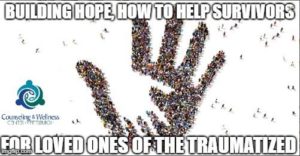
Providing Grace and Resilience to Trauma Survivors, How To – Help Guide.
October 7, 2018 by Counseling and Wellness Center of Pittsburgh abuse, abuse resources, domestic violence, help for trauma victims, rape, resilience, survivors, trauma counseling, validation, victim blaming, victims 0 comments

Provide grace & resilience to trauma survivors.
How to Provide Grace and Resiliency to a Friend or Family Member Who Discloses Trauma.
According to the United States Veterans Administration, about 50% of women and 60% of men will experience trauma at some point in their lives. Trauma is defined as an emotional response to a distressing event. Traumatic events can include witnessing or experiencing sexual or physical assault, violence, robbery, or attack. We are not all equipped with a vast understanding of psychology, and when a friend or family member turns to us with their memories of a traumatic event, more than ever we could benefit from some information on how to respond with validation, support, and compassion. The literature on trauma widely cites how important loved ones’ responses are to survivors’ disclosures of the events that they experienced. In fact, in a 2016 study by Lischner and Hong at the University of Washington, invalidating responses of friends, family, and others are correlated with an increased likelihood that the survivor will experience psychopathology including Post Traumatic Stress Disorder (PTSD). With the number of people who have survived trauma growing each year, it becomes ever more likely that someone will turn to you with their memories of a traumatic event. Below we will highlight some invalidating responses and provide validating responses so that each of us can do our best to provide caring support to those who may approach us with their heavy burden.
Validation is defined as responding with empathy, agreement, acknowledgement that we believe what was shared and that it makes sense. We can validate many levels of expression and meaning, feelings as well as thoughts. As a couples counselor, I help couples use the tool of validation to comfort each other in conflict. Validation is powerful. Some validating responses are;
- ‘Thank you for trusting me enough to share this.’
- Summarize the memories that were shared, always referring to them as memories or experiences.
- ‘That must be so (painful, scary, traumatic, other feeling word) for you.’ Summary of emotions, this is to indicate a full understanding of the feelings that the person shared.
- ‘You were so strong and brave in sharing your experiences.’ This is a compassionate response that highlights their survival skills.
- ‘How can I support you further?’ Letting the person know that you are glad to discuss any of it further, that you want to be there for them in any way that they need.
Invalidating responses can cause survivors to feel anxious, depressed, panicked, overwhelmed, and called to defend themselves and their pain. Many trauma survivors cite that invalidation from family or friends of their traumatic event is at times just as distressing as the trauma itself. Invalidation can be consciously used as a tool to manipulate and coerce, and it can be unconsciously done because the recipient to the confidence doesn’t know how to respond or help. Some examples of invalidating responses are as follows:
- ‘Why are you bringing this up right now?’ Every survivor unfolds their trauma memories to different people and in varying times, when and how they will share their trauma and with who it feels safe to share.
- ‘Are you sure you remember this accurately?’ The first duty of love is to listen and validate, provide understanding, care, warmth, and support. It is not a good time to put them on the witness stand for cross examination.
- ‘The perpetrator remembers it differently.’ Attend to the survivor’s feelings first and save the fact checking for a different time and day. Even if you feel called to defend the person or event that is being discussed as the source of trauma, this survivor is sharing something very vulnerable and the immediate need for understanding and care would indicate that we should triage and be delicate.
- ‘Try not to think about it and put it behind you.’ This response indicates that the person’s experience of grief, pain, panic, anxiety, is something that can be dismissed. Working with trauma clinically provides opportunity to experience the depth of the memories and emotions to be reprocessed. There is much evidence that the more we think we should be able to dismiss our responses to trauma, the more likely we develop PTSD.
Don’t be hard on yourself if you recognize after reading this that you may have been invalidating to someone in the past. ‘We all do our best and when we know better, we do better.’ Maya Angelou
Please pass this along. Every day another person survives and attempts to thrive in the wake of pain and anguish. Each of us has the potential power to be a safe zone, to provide support, help, and healing for those who are making sense of traumatic events, we have the ability to provide resiliency against emotional pain and we can create a buffer and reduce the development of Post Traumatic Stress Disorder.
With resiliency and hope,
Stephanie Wijkstrom, MS, LPC, NCC
Counseling and Wellness Center of Pittsburgh
*The is not a replacement for mental health support provided in a clinical setting by a licensed counselor, psychologist, or clinical social worker. If you or a loved one has experienced trauma and are working through its effects, reach out to a therapist near you.
Thank you to our editor, Dr. Stellan Wijkstrom.
For more reading;
Phan Y.Hong, David A.Lishner: General invalidation and trauma-specific invalidation as predictors of personality and subclinical psychopathology, Personality and Individual Differences. January 2016.
https://www.ptsd.va.gov/public/ptsd-overview/basics/how-common-is-ptsd.asp
Related Posts
Emotional Invalidation, cPTSD, and Its Lasting Impact
August 21, 2024
Emotional Invalidation, cPTSD, and Its Lasting Impact Emotional validation is...
What is a Trauma Bond and How to Break Free
September 26, 2024
What is a Trauma Bond and How to Break Free A trauma bond is a complex...



